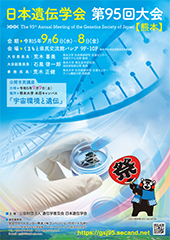【ワークショップ1】
テーマ『AI・機械学習を活用した遺伝学と医学研究』
1日目(9/6)14:00〜15:45 D会場(会議室1)
世話人: 遠藤 俊徳(北海道大学)、中川 草(東海大学)
- テーマの概要とねらい
- 計算機能力の向上、そして様々な情報学理論の発展を受けて、AI・機械学習分野の発展が著しい。遺伝学分野においても例外ではなく、様々な取り組みが行われている。本ワークショップではそのようなAI・機械学習を活用した遺伝学研究、加えて医学研究を中心に様々な応用研究について報告し、今後の研究の方向性についても議論したい。
- プログラム
- 趣旨説明 遠藤 俊徳(北海道大学) 5分
- W1-1 田口 義弘(中央大学) 30分
「テンソル分解を用いた教師無し学習による変数選択法のバイオインフォマティクスへの応用」 - W1-2 川上 英良(理化学研究所・千葉大学) 30分
「唾液オミクスと機械学習で疾患発症を予測する」 - W1-3 荻島 創一(東北大学) 30分
「ゲノムコホートの遺伝要因と環境要因の統合による疾患発症予測」 - まとめ 中川 草(東海大学) 5分
- 総合討論 5分
【Workshop 1】
Theme ”AI and Machine Learning-mediated Genetics and Medical Studies”
Organizer: Toshinori Endo (Hokkaido University), So Nakagawa (Tokai University)
- Outline and Aim of the Theme
- Recent advances in AI and machine learning studies have made remarkable progress in genetics research, including medical genetics. In this workshop, we will report on various genetics studies utilizing AI and machine learning, mainly in medical research, and discuss future research directions.
- Program
- Introduction Toshinori Endo (Hokkaido University)
- W1-1 Y-h. Taguchi (Chuo University)
Tensor decomposition based unsupervised feature extraction applied to bioinformatics - W1-2 Eiryo Kawakami (RIKEN, Chiba University)
Predicting Disease Development with Salivary Omics and Machine Learning - W1-3 Soichi Ogishima (Tohoku University)
Integrating Genetic and Environmental Factors in a Genomic Cohort to Predict Disease Development - Summary So Nakagawa (Tokai University)
【ワークショップ3】
テーマ『新型コロナウイルス研究の現在とこれから』
2日目(9/7)12:45〜14:30 D会場(会議室1)
世話人: 池田輝政(熊本大学)
- テーマの概要とねらい
- 我々は、新型コロナウイルス研究コンソーシアム「The Genotype to Phenotype Japan (G2P-Japan)」の一員として出現が続く新型コロナウイルス変異株の性状解析を進めてきた。本研究コンソーシアムにより、新型コロナウイルス変異株の性状を細胞レベルから集団レベルまで迅速に明らかにすることが可能となった。本ワークショップでは、様々な分野のエキスパートがそれぞれの視点で明らかにした新型コロナウイルスに関する研究成果と今後の研究展開を紹介する。
- プログラム
- W3-1 池田 輝政(熊本大学)
新型コロナウイルス変異株の進化と細胞融合活性の変化 - W3-2 伊東 潤平先生(東京大学)
新型コロナウイルス変異株の進化と流行動態 - W3-3 齊藤 暁先生(宮崎大学)
新型コロナウイルスの進化と中和抗体感受性の変化 - W3-4 高山 和雄先生(京都大学)
オルガノイドと臓器チップを用いた新型コロナウイルス研究 - W3-5 福原 崇介先生(北海道大学)
革新的リバースジェネティクスを用いた新型コロナウイルス研究
【Workshop 3】
Theme:Cutting edge and future direction in SARS-CoV-2 research
Day 2 (Sep 7) at 12:45〜14:30 (venue D)
Organizer:Terumasa Ikeda (Joint Research Center for Human Retrovirus Infection, Kumamoto University)
- Outline and Aim of the Theme
- We have developed a SARS-CoV-2 research consortium called 「The Genotype to Phenotype Japan (G2P-Japan)」. Through this research consortium, we are able to rapidly reveal the virological characteristics of newly emerged SARS-CoV-2 variants at a cellular level to a population level. In this workshop, experts from several research fields will talk about the findings and the future directions of SARS-CoV-2 research.
- Program
- W3-1 Terumasa Ikeda (Kumamoto University)
SARS-CoV-2 evolution and fusogenicity - W3-2 Jumpei Ito (The University of Tokyo)
The epidemic and evolutionary dynamics of SARS-CoV-2 variants - W3-3 Akatsuki Saito (University of Miyazaki)
Impact of the evolution of SARS-CoV-2 on the sensitivity to neutralizing antibodies - W3-4 Kazuo Takayama (Kyoto University)
Study on SARS-CoV-2 using organoids and organ-on-a-chips - W3-5 Takasuke Fukuhara (Hokkaido University)
Study on SARS-CoV-2 using novel reverse genetics system
【ワークショップ4】
テーマ『ユークリッド遺伝学:ポストDX時代の遺伝学から紐解く生命現象』
2日目(9/7)12:45〜14:30 E会場(会議室8)
世話人: 大林 龍胆(静岡大学)、河野 暢明(慶應義塾大学)、尾崎 省吾(九州大学)
- テーマの概要とねらい
- 膨大なオミクスデータが蓄積された今日、大規模データをいかに読み解いて、遺伝子と生命現象とを紐づけるかが重要な課題の一つとなっている。遺伝子機能の推定やタンパク質構造の予測をはじめとするデータ駆動型のドライ研究との融合は、従来の遺伝学的アプローチでは困難だった生物学的課題の解決を加速するだろう。本ワークショップでは独自のアプローチによりゲノム情報と機能とを解析してきた演者を招き、その現状を紹介していただくとともに、DX時代の遺伝学を議論する。
- プログラム
- W4-1 西口 茂孝(大阪大学)
「マルチモーダル高速AFMを用いた分裂する細菌表層の構造・力学特性・蛍光分子の同時計測」 - W4-2 白井 剛(長浜バイオ大学)
「データサイエンスによる祖先型遺伝子再現と生体機能進化の研究」 - W4-3 楊 佳約(慶應義塾大学)
「腸管粘膜細菌が宿主健康に与える影響」 - W4-4 山市 嘉治(パリ、サクレ大学)
「トランスポゾンシーケンシングで読み解くプラスミドの接合伝達」 - W4-5 富永 賢人(東京大学)
「対偶遺伝学による遺伝子の機能推定 -海洋細菌を例に」
【ワークショップ5】
テーマ『ほぼ中立説発表から50年を迎えて』
2日目(9/7)13:30〜15:15 A会場(パレアホール)
世話人:河邊 昭(京都産業大学)
- テーマの概要とねらい
- 1973年に太田朋子によって分子進化のほぼ中立説が発表されて今年で50年になります。塩基配列決定法の進歩によって、今ではゲノム単位で複数個体の多型情報を解析することが可能となり、実際に観察される多型の理解に「ほぼ中立」な進化が重要であることが明らかになってきています。本ワークショップでは発表から50年が経過して、「ほぼ中立説」を中心に集団遺伝学的な研究の発展と現状を講演していただきます。
- プログラム
- W5-1 太田 朋子(国立遺伝学研究所)オンライン参加20分
「エピジエネテイックスとほぼ中立進化」 - W5-2 長田 直樹(北海道大学)25分
「ほぼ中立説と弱有害変異について―霊長類・げっ歯類ゲノム研究の視点から」 - W5-3 手島 康介(九州大学)25分
「自然選択の検出に関する考察」 - W5-4 坂本 貴洋(総合研究大学院大学)25分
「遺伝子重複があるY染色体の進化理論」 - 総合討論 10分
【ワークショップ6】
テーマ『Mechanisms of avoiding sex extinction approaching from a variety of sex chromosomes』
テーマ『様々な性染色体からせまる性の消滅回避機構』
2日目(9/7)14:45〜16:30 D会場(会議室1)
世話人: 野澤 昌文(東京都立大学理学研究科)、風間 裕介(福井県立大学生物資源学部)
- テーマの概要とねらい
- Sex chromosomes are among the major sex-determination systems. Yet, the Y (or W) chromosome normally degenerates considerably after emergence, which possibly endangers the species persistence. Therefore, organisms should have mechanisms to avoid such crises. In this workshop, we would like to discuss how organisms have overcome the Y-chromosome degeneration by focusing on a variety of sex chromosomes in different organisms.
- 性染色体は代表的な性決定機構のひとつである。しかし、性染色体の獲得は通常Y(もしくはW)染色体の退化をともなうため、性の消滅や種の絶滅にもつながりかねない。したがって、生物はこの危機を回避する何らかのメカニズムを持っているはずである。本ワークショップでは、いくつかのユニークな性染色体に焦点を当て、生物がどのようにしてY(やW)染色体の退化に対抗してきたのかを議論する。
- プログラム
- <使用言語:英語(ただし日本語での質疑応答可)>
- W6-1 Dmitry A. Filatov (University of Oxford)
Why plant Y-chromosomes degenerate slower than in animals ? - W6-2 Takashi Koyama (Nagasaki University) 小山 喬(長崎大学)
SEX-linked loci in a recombination-suppressed region confer femaleness at gene expression level in Seriola fish. - W6-3 Shun Hayashi (Hiroshima University) 林 舜(広島大学)
Emergence of a sex-determining gene dm-W through transposon activation on Xenopus frog hybridization - W6-4 Katsuyuki Yamato (Kindai University) 大和 勝幸(近畿大学)
Don’t be trapped by dogma-a lesson from the sex chromosomes in the liverwort Marchantia polymorpha
【ワークショップ7】
テーマ『ドグマを超えた微生物分子ダイナミクス研究の挑戦』
2日目(9/7)14:45〜16:30 E会場(会議室8)
世話人: 仁木 宏典(国立遺伝学研究所)、片山 勉(九州大学)
- テーマの概要とねらい
- 精力的な分子生物学研究により、微生物ゲノム動態や細胞分裂の解析が詳細に進んできた。ある範囲では定式化した理解が広まり、さらに一部はドグマ化したように考えられるようにもなった。しかし、それで完全に理解されたというのは錯覚であり、さらに新たなパラダイムにおける未知の機構が秘匿されている。平賀壮太博士(2020 年逝去)は熊本大学において常に既存のドグマに挑戦し、新分野の原点となるブレイクスルーを導いて来た。新たなブレイクスルーに挑戦にする微生物分子ダイナミクス研究を紹介する。
- プログラム
- W7-1 仁木宏典(国立遺伝学研究所)
バクテリアゲノムの中の一本鎖DNA領域:安定なDNA開裂は稀ではないのかも?
A single-stranded DNA segment in chromosome DNA of living bacteria: Long time exposing a single-stranded DNA segment may not be rare. - W7-2 應 蓓文(イン ベイウェン)(筑波大学)
ゲノム進化によるゲノム縮小への補完:すべての道はローマに通ず
Evolutionary compensation for genome reduction: All roads leading to Rome. - W7-3 藤原 慶(慶應義塾大学)
創る立場で補う遺伝学:細胞分裂面決定とゲノム転写翻訳
Challenges to complement genetics by in vitro reconstruction: Cell division plane determination and transcription-translation of genome. - W7-4 田中誠司(高知工科大)
DNA二本鎖切断(DSB)修復の暗黒面:DSB修復が細胞に牙を剥く時
The dark side of DNA double-strand break (DSB) repair: When DSB repair finishes off cells. - W7-5 片山 勉(九州大学)
細菌染色体の複製開始の分子機構:多様性に潜む普遍性
Molecular mechanisms in replication initiation of bacterial chromosomes: Universality hidden in diversity.
【ワークショップ8】
テーマ『ゲノムビッグバン - ゲノムの起源と爆発的進化メカニズムの解明』
2日目(9/7)16:45〜18:30 D会場(会議室1)
世話人: 小倉 淳(長浜バイオ大学)、峯田 克彦(早稲田大学)
- テーマの概要とねらい
- 共通の遺伝暗号や遺伝子発現の仕組みを獲得したゲノムはどのような起源を持つのか、また、同時にどのようにして生物は多様性を生み出してきたのか。これらは生物学上の根本的な問いである。本ワークショップでは、この生物の共通性と多様性をもたらすゲノムの起源と爆発的な進化「ゲノムビッグバン」に焦点をあて、関連する研究を紹介し議論を深めたい。
- プログラム
- 趣旨説明 小倉 淳(長浜バイオ大学)
- W8-1 布浦 拓郎(JAMSTEC)
中央代謝経路の可逆性と生命進化 - W8-2 遠藤 俊徳(北海道大学)
De novo Gene Birth: 非遺伝子領域から新たに誕生する遺伝子 - W8-3 中川 草(東海大学)
哺乳類におけるウイルス由来の遺伝子の多様な進化 - 終わりに 峯田 克彦(早稲田大学)
【ワークショップ9】
テーマ『生物選択者激減の現状と提案 ~学びたい科目を選択できるようにするには~』
2日目(9/7)16:45〜18:30 E会場(会議室8)
世話人: 﨑村 奈央(代々木ゼミナール、駿台予備学校)、吉信 公美子(熊本大学)
- テーマの概要とねらい
- センター試験・共通テストにおける生物選択者が激減しているのをご存知ですか? この大きな原因は、教育側の都合、つまり大人の都合で学生が生物を学びたくても学べない構造になっていることです。今年の共通テストの生物平均点が低く[39.74点 得点調整後48.46点(物理は63.39点)]、生物離れに一層拍車をかけることになるでしょう。
「大人の都合で生物を選択できない構造をなくし、学生自身が興味のある理科の科目を選択できるようにしたい!」
そこでこのワークショップで、受験生と関わる異なった立場の2人が現状を報告し、改善案を提案します。第二部では、東大教授の小林武彦先生を迎え、パネルディスカッションを行います。 - プログラム
- 第一部 教育現場からのレポート
講演1
講師:﨑村 奈央(代々木ゼミナール・駿台予備学校 生物科講師)
タイトル:生物選択の受験生が減少している背景
The background to the decrease in the number of college entrance examinees who choose biology
講演2
講師:三浦 清武(福岡県立修猷館高等学校教諭)
タイトル:高校現場からの報告
A report on the situation in high school - 第二部 パネルディスカッション
パネリスト:
﨑村 奈央(代々木ゼミナール・駿台予備学校 生物科講師)
三浦 清武(福岡県立修猷館高等学校教諭)
小林 武彦 (東京大学定量生命科学研究所、生物科学学会連合前代表)
司会進行:
吉信 公美子 (熊本大学 生命資源研究・支援センター)
【ワークショップ10】共催:遺伝子研究安全管理協議会(遺伝子協)
テーマ『遺伝子組換え生物及びゲノム編集生物の取扱』
3日目(9/8)10:15〜12:00 D会場(会議室1)
世話人: 荒木 正健(熊本大学)、西内 巧(金沢大学)
- テーマの概要とねらい
- 遺伝子研究安全管理協議会(遺伝子協)は、会員相互の密接な連絡と協力により、現在様々な分野で必須の技術となっている遺伝子改変実験の安全を確保することで、生命科学における研究及び教育の進展に寄与することを目的としています。元々国立大学の遺伝子実験施設を中心に設立された協議会ですが、現在では私立大学、公的研究機関、民間企業など幅広い会員の協力により、日本における遺伝子改変実験の安全確保体制の構築と研究推進に貢献しています。このワークショップでは、これまでに遺伝子協が開発した教育教材の紹介と、遺伝子改変生物の新たな活用法や取扱の際に注意すべきことを議論します。
- プログラム
- W10-1 足立 香織(鳥取大学)
遺伝子組換え実験の教育教材の紹介 - W10-2 鈴木 智大(宇都宮大学)
遺伝子組換えキノコ類の拡散防止措置 W10-3 嘉糠 洋陸(東京慈恵会医科大学)
遺伝子組換え蚊による感染症コントロールの現状と課題- W10-4 岡本 裕之(水産研)
ゲノム編集を使ったブルーギルの防除技術の開発 - W10-5 三輪 佳宏(理研BRC)
遺伝子実験における研究DX
【ワークショップ11】
テーマ『マウス胚発生過程において母親由来・父親由来ゲノムは構造的・機能的に何が違うのか?』
3日目(9/8)10:15〜12:00 E会場(会議室8)
世話人: 高橋 沙央里(理研・BDR)、佐渡 敬(近畿大学)
- テーマの概要とねらい
- 発生初期のマウス胚で、卵および精子由来のゲノムには染色体高次構造から遺伝子発現に至るまで、様々な次元で差異が認められる。この差異はX染色体不活性化など発生に必須なイベントに関与するが、その制御の詳細や胚発生への影響については不明な点が多い。本ワークショップでは、マウスの生殖細胞や初期発生における染色体やエピゲノム動態の制御に関する最新の知見を共有し、配偶子ゲノムの差異が表現型におよぼす影響について議論したい。
- プログラム
- W11-1 大杉美穂(東京大学院・総合文化研究科)
「雌雄のゲノムを独立の前核としてもつマウス受精卵の形成機構」 - W11-2 高橋沙央里(理化学研究所・生命機能科学研究センター)
「マウスの胎生期型から体細胞型へのDNA複製プログラムの切り替えは特殊な移行期型S期を経由する」 - W11-3 志浦寛相(山梨大学・生命環境学部生命工学科)
「ウイルス由来遺伝子がもたらした父親ゲノム特異的機能」 - W11-4 井上貴美子(理化学研究所・バイオリソース研究センター)
「体細胞クローンマウス胎盤形成における刷り込み遺伝子の役割」 - W11-5 長尾恒治(大阪大学・理学研究科)
「Smchd1-Hbix1によるモノアレリック遺伝子発現制御」
【Workshop 11】
Theme: Impacts of the structural and functional differences between parental genomes on mouse embryonic development
Organizers: Saori Takahashi (RIKEN, BDR), Takashi Sado (Kindai Univ.)
- Outline and Aim of the Theme
- During mouse embryonic development, paternally and maternally derived genome manifest structural and functional differences (e.g., 3D genome structure and gene expression). Although such differences play critical roles in the events essential for embryonic development, such as X chromosome inactivation, the molecular basis of how such differences are produced as well as their effect on development are not fully understood. In this workshop, we will share the latest findings of the researchers who work on chromosome/epigenome dynamics during mouse development and discuss the relationship between the gametic differences of the genome and phenotypes.
- Program
- W11-1 Miho Ohsugi (Grad. Shool of Arts and Sci., Univ of Tokyo)
Mechanism of Formation of Mouse Zygotes with Distinct Pronuclei for Male and Female Genomes - W11-2 Saori Takahashi (RIKEN, BDR)
An embryonic-to-somatic DNA replication program switch is accompanied by a unique transitional S-phase during early mouse embryogenesis - W11-3 Hirohisa Shiura (Univ. of Yamanashi)
Paternal genome-specific functions conferred by virus-derived genes in mammals - W11-4 Kimiko Inoue (Bioresource Research Center, RIKEN)
Elucidation of imprinted genes responsible for hyperplasia in somatic cell nuclear transferred placentas - W11-5 Koji Nagao (Graduate School of Science, Osaka University)
Regulation of monoallelic gene expression by Smchd1-Hbix1



